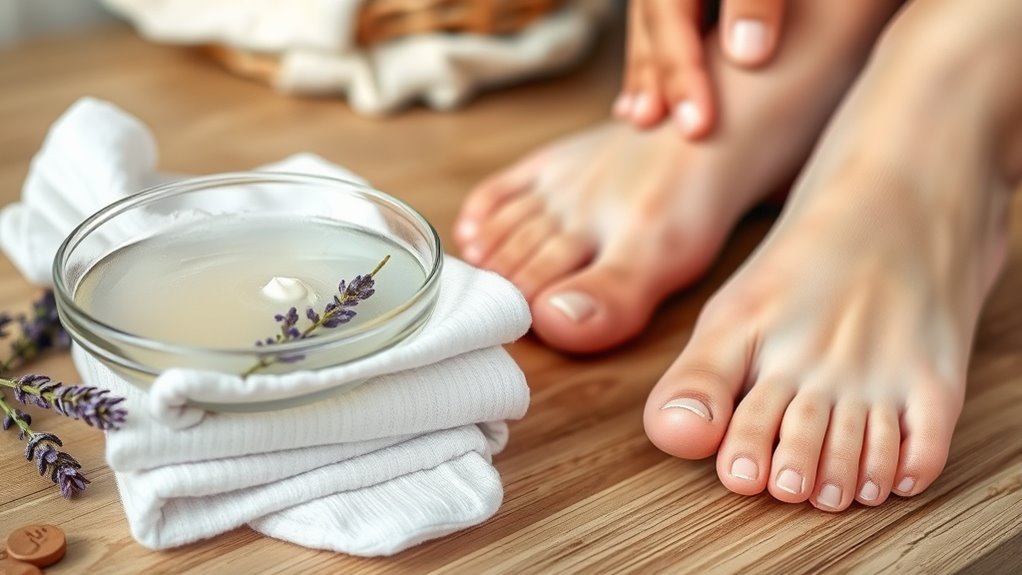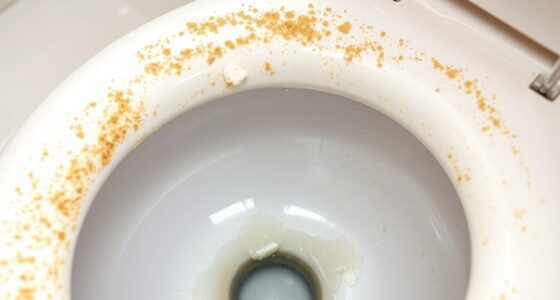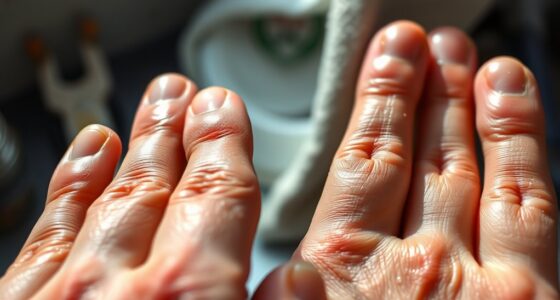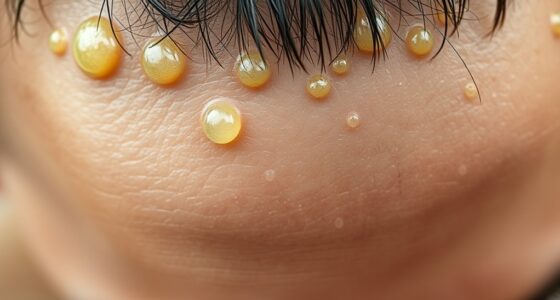If you want to combat foot odor, start with breathable socks made from cotton or wool to keep feet dry. Try soaking your feet in warm water with antibacterial solutions or tea tree oil to reduce bacteria and fungi. Maintaining good skin hygiene and using foot powders helps keep odor at bay. Consistently changing socks, insoles, and practicing proper foot care can make a real difference. Stick around, and you’ll discover even more effective steps to keep your feet fresh.
Key Takeaways
- Wear breathable socks made from natural fibers like cotton or wool to keep feet dry and reduce odor.
- Use antibacterial foot soaks with tea tree oil or antifungal solutions to eliminate bacteria and fungi.
- Regularly wash feet with antibacterial soap and dry thoroughly, especially between toes, to prevent moisture buildup.
- Incorporate foot powders or sprays designed for odor control to keep feet dry and fresh throughout the day.
- Replace insoles and socks frequently, and use odor-absorbing insoles for ongoing moisture and bacteria management.

Are you tired of dealing with stubborn foot odor that just won’t go away? I’ve been there, and I know how frustrating it can be to find a solution that actually works. One of the first things I discovered was the importance of using the right shoe insoles. Regular insoles can trap moisture and bacteria, making odor worse over time. Switching to specialized, odor-absorbing shoe insoles made a huge difference. They help wick away sweat and keep your feet dry, which is key because bacteria thrive in damp environments. I also found that replacing insoles regularly prevents buildup of odor-causing bacteria, so I don’t have to deal with the same problem repeatedly. Pairing these insoles with antibacterial sprays inside my shoes added an extra layer of protection. I spray the insides of my shoes every few days, especially after intense activity, to kill bacteria that might be lurking. It’s quick, easy, and really effective in keeping my shoes fresh.
Beyond insoles and sprays, I learned that the right foot care routine makes a big difference. Washing my feet daily with antibacterial soap helps reduce bacteria on the skin’s surface, which is often the root of persistent odor. I make sure to dry my feet thoroughly, especially between the toes, because moisture is a breeding ground for bacteria. Using powders designed for foot health also helps keep my feet dry throughout the day. I’ve noticed that wearing breathable socks made from natural fibers like cotton or wool helps wick away sweat and allows air to circulate, further preventing odor buildup. Additionally, proper foot hygiene and maintaining a clean environment can prevent bacterial growth and odor formation more effectively over time.
In addition to daily hygiene, soaking my feet occasionally in a mixture of warm water and antibacterial solutions gives me a deeper clean. I add a few drops of tea tree oil or use foot soak products with antifungal ingredients. These soaks not only refresh my feet but also help control bacteria and fungi that cause odor and infections. After soaking, I always dry my feet thoroughly and apply a light, antibacterial foot cream to keep the skin healthy and less prone to odor formation.
Frequently Asked Questions
Can Specific Socks Prevent Foot Odor Better Than Others?
Yes, I’ve found that moisture-wicking socks made from antimicrobial materials can really help prevent foot odor. These socks keep my feet dry by pulling away sweat, which bacteria thrive on. Plus, the antimicrobial fabric fights odor-causing bacteria directly. I always choose these types over regular socks, and it makes a noticeable difference in keeping my feet fresh and odor-free throughout the day.
Are Natural Remedies More Effective Than Commercial Products?
I find that natural remedies like herbal remedies and essential oils can be quite effective for foot odor, often providing a gentle, chemical-free option. I prefer using tea tree or lavender oil because they have antimicrobial properties that help combat odor-causing bacteria. While commercial products work well too, I think natural options are worth trying first, especially if you want a more holistic approach to foot care.
How Often Should I Replace My Socks for Odor Control?
Honestly, I replace my socks daily—who wants to wear the same stinky pair twice? Sock materials matter; moisture-wicking fabrics help odor control. I wash my socks after each use, ensuring they stay fresh. If you’re using cotton or wool, consider changing them more often, especially if you notice any odor. Regular washing and swapping out socks keep my feet smelling great and feeling comfortable.
Do Foot Powders Work Better Than Sprays?
I find foot powders often work better than sprays because they absorb moisture and reduce friction directly on the skin, which helps control odor longer. Powders provide better powder absorption and stick to the skin, preventing sweat buildup. Sprays are convenient and offer quick spray coverage, but they tend to fade faster and don’t absorb moisture as effectively. For lasting odor control, I prefer powders—plus, they keep my feet feeling dry.
Can Diet Influence Foot Odor Significantly?
Absolutely, diet impact can be significant when it comes to foot odor. Food choices like spicy foods, alcohol, and processed snacks can increase sweat and bacteria production, leading to stronger odors. I’ve noticed that cutting back on these and eating more fresh fruits, vegetables, and water helps reduce foot smell. Staying mindful of what I eat definitely makes a difference in managing foot odor naturally.
Conclusion
Think of your feet as a garden—if neglected, weeds and pests take over, causing trouble. But with the right care—socks that shield, soaks that cleanse, and skin that breathes—you’re the gardener tending to your own oasis. Each small act is like pruning and watering, keeping your garden vibrant and healthy. So, embrace these solutions and nurture your feet, transforming them from troubled terrain into a thriving, fresh landscape you can walk with pride.









